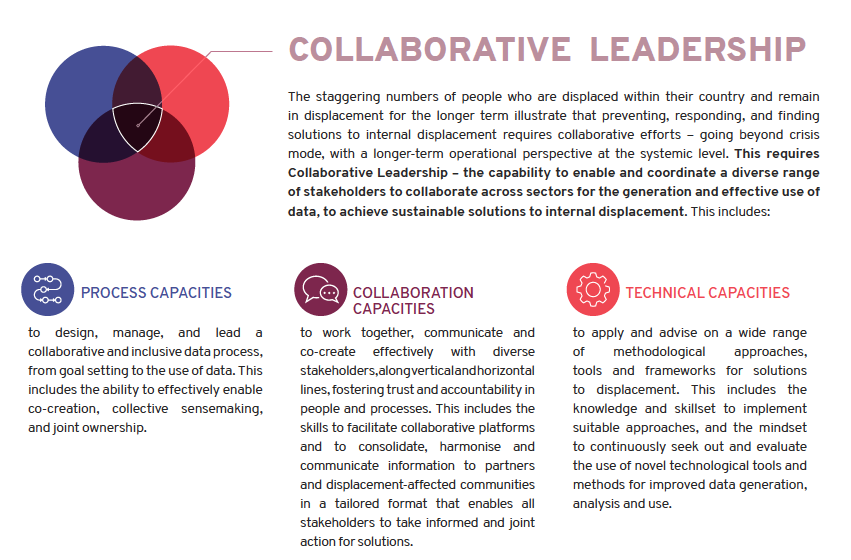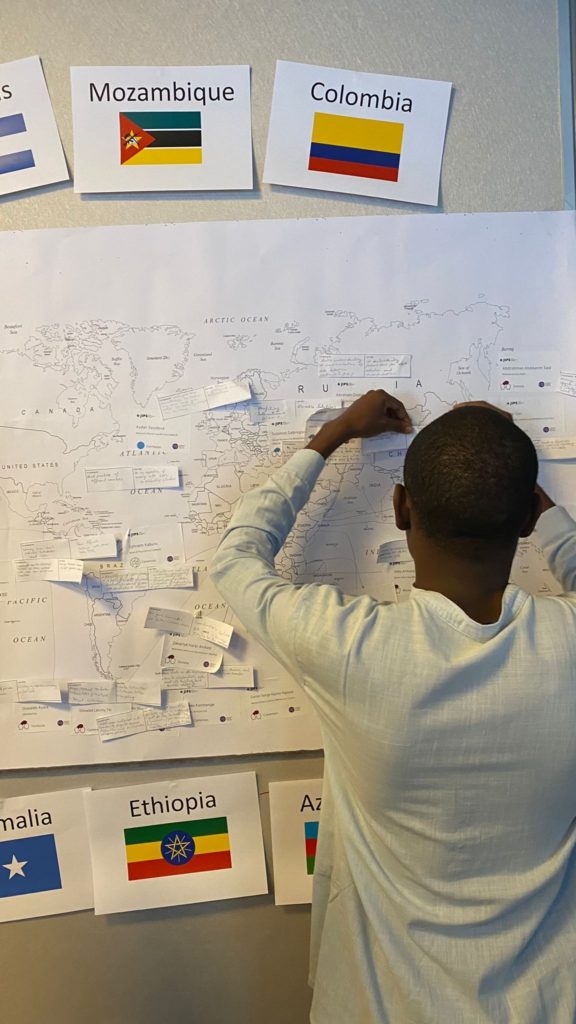JIPS recognises that leadership, collaboration, and data are key to supporting governments and their partners in strengthening displacement data ecosystems. With government responsibility and political will at the core of durable solutions, JIPS provides tools and techniques to improve the quality, availability, and use of data as the foundation for effective action. Capacity strengthening is woven throughout its support to advance not only data expertise but also the capacities of governments and their partners to work collaboratively with others towards coherent, nationally owned data systems. This is where the Collaborative Leadership Programme (CLP) comes into play.
The CLP capitalises on a wealth of expertise accumulated over JIPS’ 15+ years of work and was comprehensively updated in 2022. For the 2024 edition, JIPS, through its country partners, selected 40 individuals from over 20 organizations in six countries where displacement is a significant issue, and where JIPS provides ongoing support: Azerbaijan, Cameroon, Colombia, Ethiopia, Honduras, Mozambique, and Somalia. The training was co-funded by USAID’s Bureau for Humanitarian Assistance (BHA), the European Commission’s Directorate-General for European Civil Protection and Humanitarian Aid Operations (ECHO), and the Danish International Development Agency (DANIDA).
The CLP strengthens the capacities of national and regional actors to plan, manage, and facilitate data-driven interventions and data governance. Its unique feature: it promotes Collaborative Leadership, defined as the ability to coordinate a diverse range of stakeholders across sectors to generate and utilize high-quality data effectively. The programme focuses on developing three interconnected capacities, namely Process, collaboration and technical capacities:

The model of ‘Collaborative Leadership’ for the generation and use of displacement data.
Based on the ‘Collaborative Data Process’, the training covers several core areas including applying robust and agreed-upon methodologies for data collection in displacement settings; cultivating learning on consensus building among diverse stakeholders; how to engage communities throughout the data process; and using evidence to craft actionable recommendations for policy and programmatic decisions. Each core area is underpinned by concrete country case studies where JIPS is currently supporting collaborative IDP data initiatives.
The learning journey includes a six-weeks e-learning phase, focusing on the Collaborative Data Process, in which participants can engage with one another on dedicated sections of the e-learning platform, during online office hours and during thematic live sessions with all participants and JIPS experts. A three-day in-person workshop brings the learning experience to life.
Facilitated sessions combine case studies and hands-on exercises that allow participants to share and apply theoretical knowledge in practice. Training sessions also make space for discussions around the challenges that participants face in their own work on displacement data and solutions. The training cycle concludes with a ‘transfer lab’ event, where participants share how they concretely applied the learning from the training. This strengthens the learning transfer but also creates accountability and can inspire further action, thus amplifying the positive outcomes from the training.
The training emphasises that generating solutions for displacement affected populations can never be a one-person or one-institution show and exposed the potential, creativity and implementation power of bringing together different capacities in a country. The PCT (Process, Collaboration and Technical) competency framework can be a meaningful instrument to evaluate and strengthen capacities in institutions that are at the forefront of finding sustainable solutions to internal displacement.
The composition of participants was instrumental to maximise the impact of the training. While the CLP in 2023 set the focus on a singular region, gathering participants from the East and Horn of Africa exclusively, the 2024 edition brought together participants from diverse regional contexts. Despite differences in geographic backgrounds, participants found that they share similar challenges which allows for exchanges on solutions and joint learning. All participants recognise the added value of such transnational – and transregional – exchanges to inform their national responses.
Natalia Romero, from Colombia’s Victims Unit, for example, highlighted how the training provided an invaluable opportunity to learn from other countries’ experiences. The more than vast experience in data collection and production of the Victim Unit in Colombia and other participating government entities are a remarkable source of knowledge and learning among peer participants.
Dedicated focus sessions allowed participants from the same country to discuss and jointly define tangible follow-up actions to improve collaboration and data within their specific contexts. Thematic learning spaces, such as on community engagement, official IDP statistics, and urban and area-based analysis, made space for participants to present activities and approaches used in their respective countries. For instance, participants from Somalia presented their national framework on IDP statistics, as well as a case study on surveying IDPs to advance solutions responses in Galmudug State. Colombian participants showcased their use of data to assess the vulnerabilities of IDPs and formulate targeted institutional interventions. They also demonstrated their unique approach to generating statistics on IDPs.

The CLP is underpinned by a rigorous monitoring system to evaluate participants’ knowledge increase and change in practices and behaviours along the specific learning goals of the training. Since its inception, the CLP achieves high marks in terms of participants’ satisfaction. The 2024 edition of the training is no exception in this regard: surveys conducted during and following the training consistently revealed respondents’ high satisfaction (with more than two thirds of the respondents finding the course “very relevant” to their professional development).
“The training gave “valuable insights into internal displacement, durable solutions, and collaborative approaches to data”, as well as “a new understanding of how to conduct research and design programs and projects in a meaningful, inclusive, and supportive way for all relevant stakeholders.”
– Donor participant
Various topics emphasised in the training had tangible impacts across diverse contexts. In Somalia’s Galmudug state, local government participants expressed a renewed commitment to involving communities in displacement data efforts. Similarly, in Cameroon, participants integrated community consultations into an ongoing profiling exercise with further plans for systematic application and scalability across IDP data efforts in-country. Ethiopia’s representatives were inspired to incorporate community assessments into data collection for the National Durable Solutions Strategy, while in Mozambique, the training spurred progress in formalizing a Technical Working Group for urban profiling. In Colombia, the CLP’s focus on area-based approaches strengthened coordination among government bodies and deepened the inclusion of displacement-affected communities in data processes, paving the way for more effective, locally informed solutions.
Peer learning has long been at the centre of the CLP training journey; however, the 2024 edition took the approach to a new level by convening colleagues from different actors’ country contexts across the globe, with active projects related to data and internal displacement. This fostered exchange and learning well beyond regions and among actors that may not usually directly interact. Ultimately, this benefitted the participants’ individual journeys as much as the JIPS-supported country projects.
Well-received by participants, this approach will continue to shape JIPS’ future CLP courses, nesting capacity strengthening in the existing country contexts and systems as well as within country actors and their international partners for the learning benefits to unfold their full potential in the day-to-day work of participants.
Looking at 2025 more specifically, JIPS will incorporate CLP learning modules into a planned country-level training in Somalia, where we currently support the Federal Government of Somalia and UN actors on the development of a Capacity Building Framework, under the 2024-25 IDSF project and as a key deliverable under Somalia’s National Solutions Pathways Action Plan 2024-29. It will be exciting to use this work to also deepen the commitment for localised trainings and to further evaluate its added long- term value.